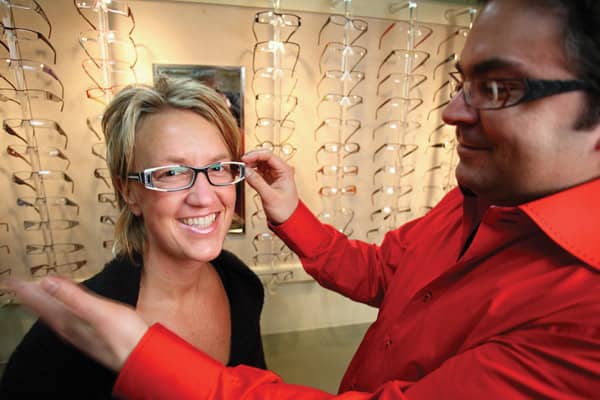Shopping can involve fashion and frivolity, but at the end of the day it's about protecting your vision
Like the vision test that precedes it, shopping for corrective eyewear can be a real eye opener. Once sold only by optometrists and major department stores, prescription glasses and contact lenses are now widely available at specialty optical stores, big box stores, grocery stores, and over the internet. Price isn't the only factor in deciding where to shop, but for most of us it is a major one.
However, even the savviest consumer will find it a challenge to shop comparatively for prescription eyewear. The challenge is especially difficult with glasses. Many frames look similar and are likely made in the same factory from the same materials, but different brand names and slightly varied detailing prevents a direct comparison. A further obstacle is the fact that some retailers have a seemingly endless combination of regular discounts and special offers. It's tough to compare the prices of two pairs of glasses when one pair comes with a free second pair and the other with a digital camera.

Finding the best price for contact lenses is easier, but hidden fitting fees and manufacturer's rebates will impact the final bill.
So, while it is difficult to shop comparatively for corrective eyewear, it is not impossible. The first step is getting a prescription-essential for purchasing contact lenses and advisable when buying glasses. Some retailers will work with your current glasses as a model, but others want a prescription from an eye test done within the past two years.
There is some confusion about where to get a prescription because the three main eye care health professionals have similar names: ophthalmologist, optometrist and optician. They also have some similar roles. The thing to remember is that unless you have a serious eye condition that warrants the attention of an eye surgeon (ophthalmologist), or an existing prescription that you can provide to someone trained in fitting and dispensing eyewear (optician), you will need to see an optometrist for routine eye exams and to get a prescription for corrective eyewear. Optometrists are doctors of optometry. In addition to performing eye exams and prescribing corrective eyewear, optometrists also diagnose serious eye conditions like glaucoma, cataracts and macular degeneration. In Nova Scotia they are in private practice and set their own professional fees. Rates tend to be consistent, with three independent optometrists in the Annapolis Valley, for instance, recently reporting fees of around $60 for an eye exam.
Once you have a prescription, you are free to purchase your eyewear wherever you like. Because it takes time to become accustomed to wearing contact lenses, first-time contact lens wearers are well advised to make at least their initial purchase from their optometrist. Some optometrists charge higher prices for similar items, but given the number of things that can go wrong with contact lenses, it's hard to overstate the importance of a trusted, well-informed, professional with whom you have an existing relationship. As well, your optometrist may have access to manufacturer's rebates that level the paying field.
Consider the prices that one especially savvy shopper found for her contact lenses by calling three different outlets on the same day in November. At the Superstore in Halifax, the price for Focus Night and Day lenses was $80 for a box of six. A fourth box was free of charge with the purchase of three. This made the price of four boxes $240, averaging $60 per box. On the same day the Bayer's Lake Costco was selling Focus Night and Day lenses for $65.99 for a box of six, or $263.96 for four boxes. In the valley, Vision Care Optometry Clinic in Wolfville was charging $345 for four boxes, but offered a $100 rebate coupon that lowered the average price per box to $61.25.
Comparing the price of eyeglasses is more difficult and requires some legwork. For example, in early November, the same savvy shopper canvassed three different stores to determine the price you might expect to pay for a pair of similar-looking eyeglasses. The Savvy Shopper took with her a prescription for single vision glasses and a desire for stylish red rectangular frames that would minimize the fullness of her round face [see above for more information about the shape of eyeglasses].
The Pearle Vision store in New Minas had a large assortment of eyeglasses and a staff optician who was available to help. Regular plastic lenses were priced at $109, with the price jumping to $189 for a thinner polycarbonate lens with UV protection and scratch coating. A special anti-reflective coating took the price still higher to $229. As an added incentive, the thinner lenses came with either a free pair of glasses or a Canon Powershot 7.1 megapixel digital camera. Those who don't want the free glasses or the camera receive a 30 per cent discount Pearle Vision also had an impressive selection of red rectangular glasses. Plastic frames made by Vogue were $169.99. Plastic frames made by Chaps were $179.95 and metal frames by DKNY were the same price. An especially "cool" metal Roots frame with a filigree (decorative wire) effect on the arm was $199.95. A matte-red metal frame made by Dolce & Gabanna was $223 and a red/bronze metal Versace frame topped the list at $314.
At the Wal-Mart in New Minas the Savvy Shopper found two opticians and a student optician. She also found regular plastic lenses for $40. Anti-glare and scratch resistant coatings took the price of regular plastic lenses to $135. A thinner polycarbonate lens with scratch protection cost $98, and an even thinner lens with all available coatings was priced at $199.
The most expensive frame at Wal-Mart was $199, but nice options were available for much less. The George metal frame was $59. A Point Zero metal frame with striking black outer arms was $109. A wine-red plastic Jennifer Lopez frame (JLo to her friends) trimmed with tiny rhinestones was $139 and a Jai Kudo plastic frame with even more rhinestones was $199. The metal EasyClip frame that comes with its own magnetic sunglasses was priced well at $179.
The Superstore has two optical locations in Nova Scotia, one at the Joseph Howe store and the other in Lower Sackville. Both locations have qualified opticians and contact lens fitters, but at this point only the Halifax Superstore has an optometrist who does eye exams on location. The Superstore carries a wide variety of frames and contact lenses. Regular, single vision lenses start at $45. Super light, super thin lenses start at $80. An anti-reflective coating with scratch resistance costs another $65 and you can add another $30 for a super scratch resistant coating.
Frames at the Superstore start at $19, but at that price there was nothing in a fashionable red rectangle. A quick look did produce two $19 frames: a round one made from transparent plastic and a rectangular plastic frame in an unattractive pink colour. (Neither would have looked good on the Savvy Shopper). The range of suitable red rectangles started with a plastic frame made by Enchant for $99. There was also a plastic JLo frame with rhinestones and a slightly cat-eyed look for $159 and a metal Nine West rectangle for $179. [see the caution about excessive glitz below]. A metal and plastic Easy Clip frame was similar to the one sold at Walmart but priced higher at $239. A red plastic Armani Exchange (AX) frame with black trim was also $239. There are no free gifts and no regular discounts for seniors at the Superstore, however there was a 50 per cent reduction on the base price of lenses on the day of the Savvy Shopper's visit.
